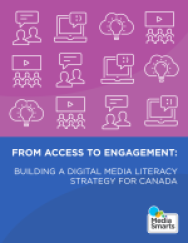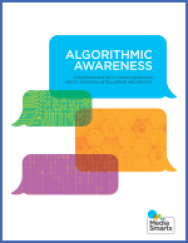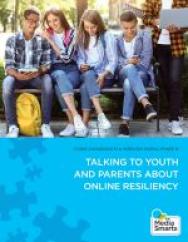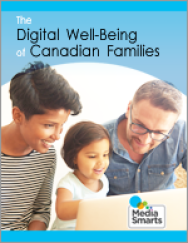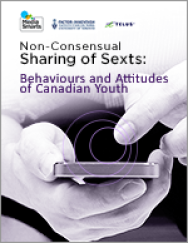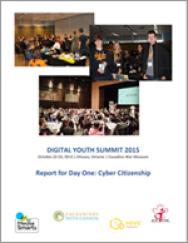Researching Young Canadians in a Wireless World
Young Canadians in a Wireless World (YCWW) is Canada’s longest-running and most comprehensive research study on young people’s attitudes, behaviours and opinions regarding the internet, technology and digital media. This extended research methods report offers a deeper dive into the decisions and processes undertaken by the MediaSmarts research team during Phase IV of YCWW. The various pivots and adaptations taken during this phase deserve elaboration and will be of interest to other researchers who have made, and continue to make, shifts in their work due to the COVID-19 pandemic.
From Access to Engagement: Building a Digital Media Literacy Strategy for Canada
In February 2022, MediaSmarts hosted a symposium that brought together key stakeholders and community partners from across Canada who share an interest in developing and implementing a national digital media literacy strategy. This report summarizes the discussions that took place at the symposium along with key findings from an environmental scan of existing national and international digital media literacy strategies.
Algorithmic Awareness: Conversations with Young Canadians about Artificial Intelligence and Privacy
MediaSmarts conducted focus groups with youth ages 13 to 17 to gain insight into how young Canadians understand the relationships between artificial intelligence (AI), algorithms, privacy, and data protection. Participants played a game prototype designed by MediaSmarts’ education team, and a scaffolded learning experience allowed for in-depth discussion after each of the three phases of gameplay. These conversations highlight that while youth understand and appreciate the benefits of recommendation algorithms, they are troubled by algorithmic data collection and data sharing practices. This research is a call for more algorithmic literacy tools and resources that will give youth the knowledge they need to protect themselves and their information in digital spaces.
Young Canadians Speak Out: A Qualitative Research Project on Privacy and Consent
MediaSmarts conducted focus groups with young Canadians ages 13 to 16 in Ottawa, giving them the chance to consider, discuss and design ways of obtaining consent online that are clear and meaningful to them. As part of the focus groups, youth were asked to share their thoughts on and experiences with current online consent processes. They were then asked to come up with hand-drawn ‘paper prototypes’ of their ideal privacy policies. The findings, highlighted in the report Young Canadians Speak Out: A Qualitative Research Project on Privacy and Consent, offered creative new ideas on how platforms can improve online consent processes – not just for young people, but for everyone – so Canadians can better understand what they’re agreeing to when it comes to their privacy.
Young Canadians in a Wireless World, Phase IV: Talking to Youth and Parents about Online Resiliency
In 2019, MediaSmarts conducted focus groups with youth ages 11 to 17 and their parents to better understand what is working for young people online and what needs to be changed or improved so that young people get the most out of their online experiences and their interactions with digital technology – both at home and in the classroom. Through these conversations we discovered that youth are deeply aware of the pitfalls and benefits of digital technology. This research calls attention to how we might help youth across Canada be more resilient online – with more balance, trust and support – and formed the foundation for the development of our national survey with students across Canada.
Young Canadians Pushing Back Against Hate Online
MediaSmarts conducted a survey of 1,000 youth ages 12 to 16 years old to better understand their attitudes and experiences with casual prejudice online; specifically, the motivations and external factors that influence their decisions whether or not to intervene. Study results uncover that youth experiences with online casual prejudice are common yet many youth do not respond because they don’t know what to do to make a difference. This research is a call for more effective interventions that will prepare, engage, and empower youth to push back against hate online.
The Digital Well-Being of Canadian Families
In this study, MediaSmarts conducted a survey of 825 parents of children from birth to 15 years old to learn more about their digital family life; specifically, the digital technology uses and activities of their children, their parenting style, and the opportunities and challenges that digital technology brings to parenting and family life in Canada. The results of this study emphasize that there is not a one-size-fits-all solution for digital well-being in families. However, one consistent pattern is the importance of digital literacy in tipping the scales in favour of the positive effects of digital technology use in Canadian families.
Non-Consensual Sharing of Sexts: Behaviours and Attitudes of Canadian Youth
MediaSmarts and researchers at University of Toronto’s Factor-Inwentash Faculty of Social Work conducted this study to examine how attitudes, experiences, knowledge and moral beliefs of young people impact their decisions to share or not share sexts they have received. The findings are significant not only in helping us to understand the motivating factors behind teens’ decisions either to share or not share sexts without the original sender’s consent, but also to inform development of more effective interventions to discourage young people from sharing sexts non-consensually.
To Share or Not to Share
How Teens Make Privacy Decisions about Photos on Social Media
Building on the privacy findings from our Young Canadians in a Wired World research, this qualitative study of youth ages 13 to 16 examines the reasoning that teens apply when deciding to share photos of themselves or other people electronically.
Digital Youth Summit 2015
To better understand the skills young Canadians need as citizens and future workers in the digital age, MediaSmarts and the Information and Communications Technology Council (ICTC) hosted a national Digital Youth Summit in Ottawa (October 22-23, 2015) to hear directly from secondary students on this topic. This report provides an overview of the important themes raised and discussed by the students during panel discussions, brainstorming sessions, Speakers’ Corner, and through evaluation forms.


